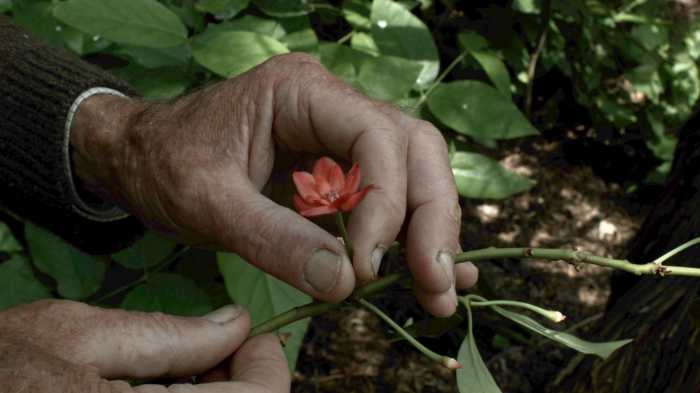A scene of the May 1968 Paris student protests in João Moreira Salles’ “In the Intense Now.” | ICARUS FILMS
Brazilian director João Moreira Salles’ sprawling documentary “In the Intense Now,” which could be summed up as a chronicle of the worldwide political revolts of 1968, begins with the promise of hope, change, and revolution. It ends with death, despair, and a Portuguese-language pop song whose singer urges the listener to put red roses on her grave. This trajectory does a pretty good job of summing up how Western culture has changed over the past 50 years, I must admit.
Salles himself was born in 1963 and uses almost no original footage, relying instead on newsreels, home movies (shot by his mother in China and Brazil), and other documentaries. But “In the Intense Now” is lopsided, claiming to cover China’s Cultural Revolution and Czechoslovakia’s Prague Spring but devoting the vast majority of its attention to May ’68 in Paris.
The most interesting aspects of “In the Intense Now” shows Salles engaging with the political implications of the material he’s using. For example, he analyzes the anonymously shot and directed “Reel 127” from 1968 Prague and suggests that its tendency to concentrate on men in the back of the frame is a pointer that the real power in that time and place lay with people who kept themselves hidden. Salles does this several times with found footage taken both in Prague and Paris. His engagement with the ideology of form recalls some of the films Jean-Luc Godard made in the ‘70s.
João Moreira Salles knows Paris, but not the larger meaning of a global outbreak
Salles clearly knows a great deal about the May ’68 revolts and he takes us through a history of their beginnings as student protests, Daniel Cohn-Bendit’s reluctant emergence as a spokesperson, their increasing vehemence, the students’ inability to fully connect with workers who had serious grievances and used this period of radicalization to express them, and General Charles de Gaulle’s use of TV appearances to crush the rebellion. The closing credits of “In the Intense Now” include a bibliography on May ’68, as well as a long list of films from which he took images. If they have been romanticized, especially in France, Salles is out to demystify them. He says that his favorite film about May ’68 is Romain Goupil’s documentary “Dead at Thirty,” and he interpolates a long stretch of it describing the eventual deaths of student radicals at a relatively young age.
An iconic slogan of that era is “Sous le pavés, la plage,” which translates roughly to “Under the pavements, the beach.” Any fan of “Mad Men” might see this coming, but Salles claims the phrase was invented by two ad agency employees trying to find a way to share their ideals with their colleagues. To twist the knife even further, one of them killed himself in the ‘70s. But if it went on to inspire genuine radicals (“In the Intense Now” shows it sprayed on Parisian walls), does it matter whose imagination it originated in?
Soviet tanks roll into Prague in August 1968, as seen in João Moreira Salles’ “In the Intense Now.” | ICARUS FILMS
“In the Intense Now” gets more than halfway into its 125 minutes before it heads to Prague, and Salles clearly doesn’t have access to the same amount of footage he had of Paris. All the images he has from China were shot by his mother on a 1966 trip there, and his perceptions of the country and the changes it was then going through are filtered by his nostalgic memories of her. To put it mildly, this makes for weird politics: by omission, “In the Intense Now” winds up suggesting that May ’68 led to more deaths than the Cultural Revolution, although Mao killed off more of his own people than Hitler or Stalin. But all that seems to matter to Salles is that his mother found China a refreshing place to visit. It would’ve been an instant death sentence for any Chinese citizen to shoot even the kind of home movies he found directed anonymously in 1968 Prague, so he is dependent on her for that portion of the film while he can draw on a dozen professionally made documentaries about May ’68.
The comparisons “In the Intense Now” has received to the late French director Chris Marker (whose great four-hour history of the ‘60s left, “A Grin Without a Cat,” gets excerpted) are wildly overstated. Salles would have been better off making an 80-minute film about May ’68, whose history he seems to have down pat. The section on Prague feels like an afterthought, while the depiction of China brings back unpleasant memories of the way ‘60s leftists romanticized Mao (while Salles doesn’t exactly do that, he doesn’t criticize him either).
The filmmaker also introduces an autobiographical element never fully developed. If the film seems haunted by suicide, perhaps Salles should not have left off-screen the fact that his mother killed herself in 1988, which lingers as subtext over her home movies if one knows about it. In this documentary’s last third, there’s a sense that he’s using politics as a pretext to speak about a personal tragedy or, at best, suggesting that her fate stood in for a generation’s. The material for a much better film existed here, but it called for a lot more editing and a different perspective.
IN THE INTENSE NOW | Directed by João Moreira Salles | Icarus Films | In Portuguese, French, and Czech with English subtitles | Opens Jan. 31 | Film Forum, 209 W. Houston St. | filmforum.org




































